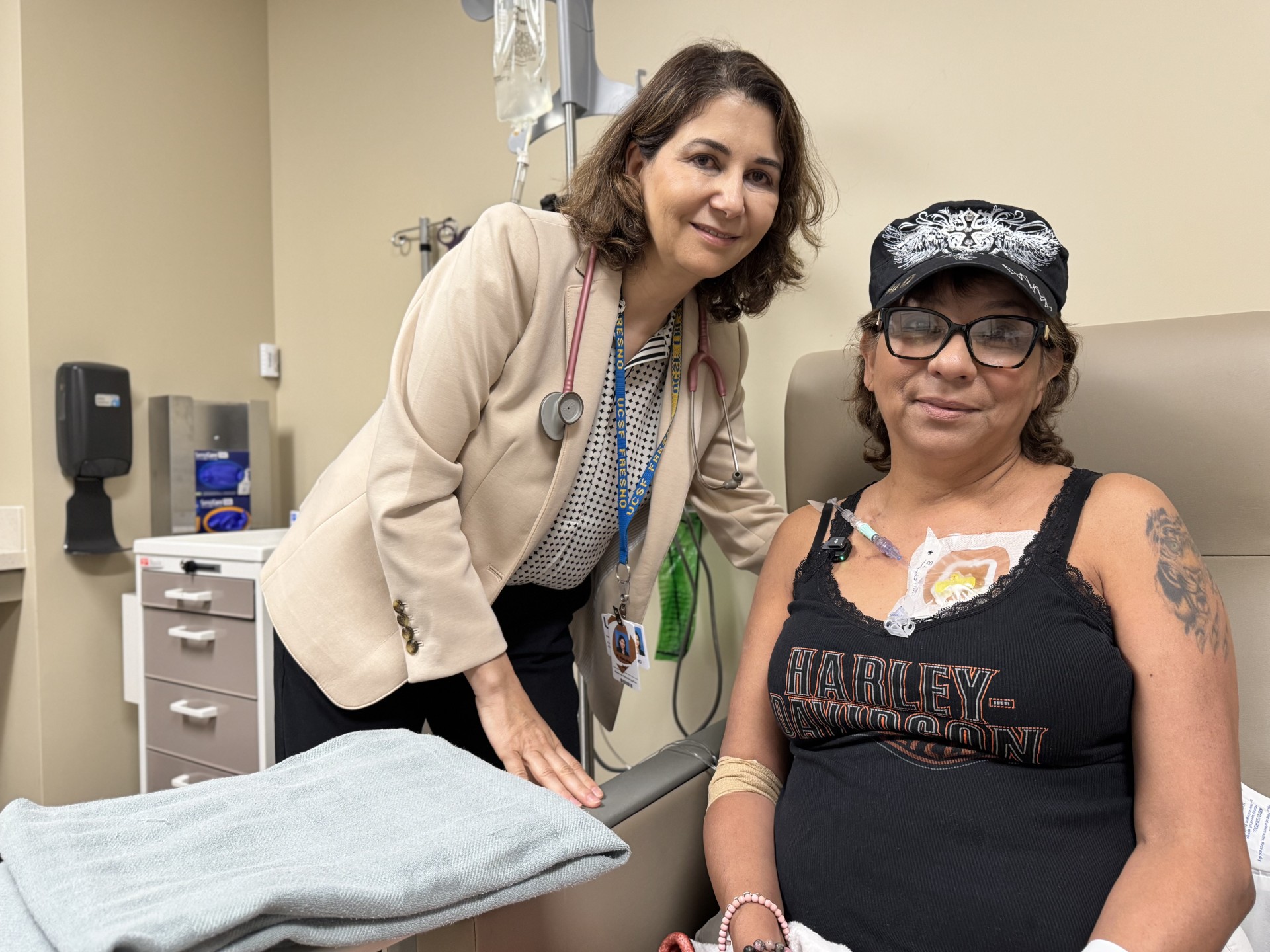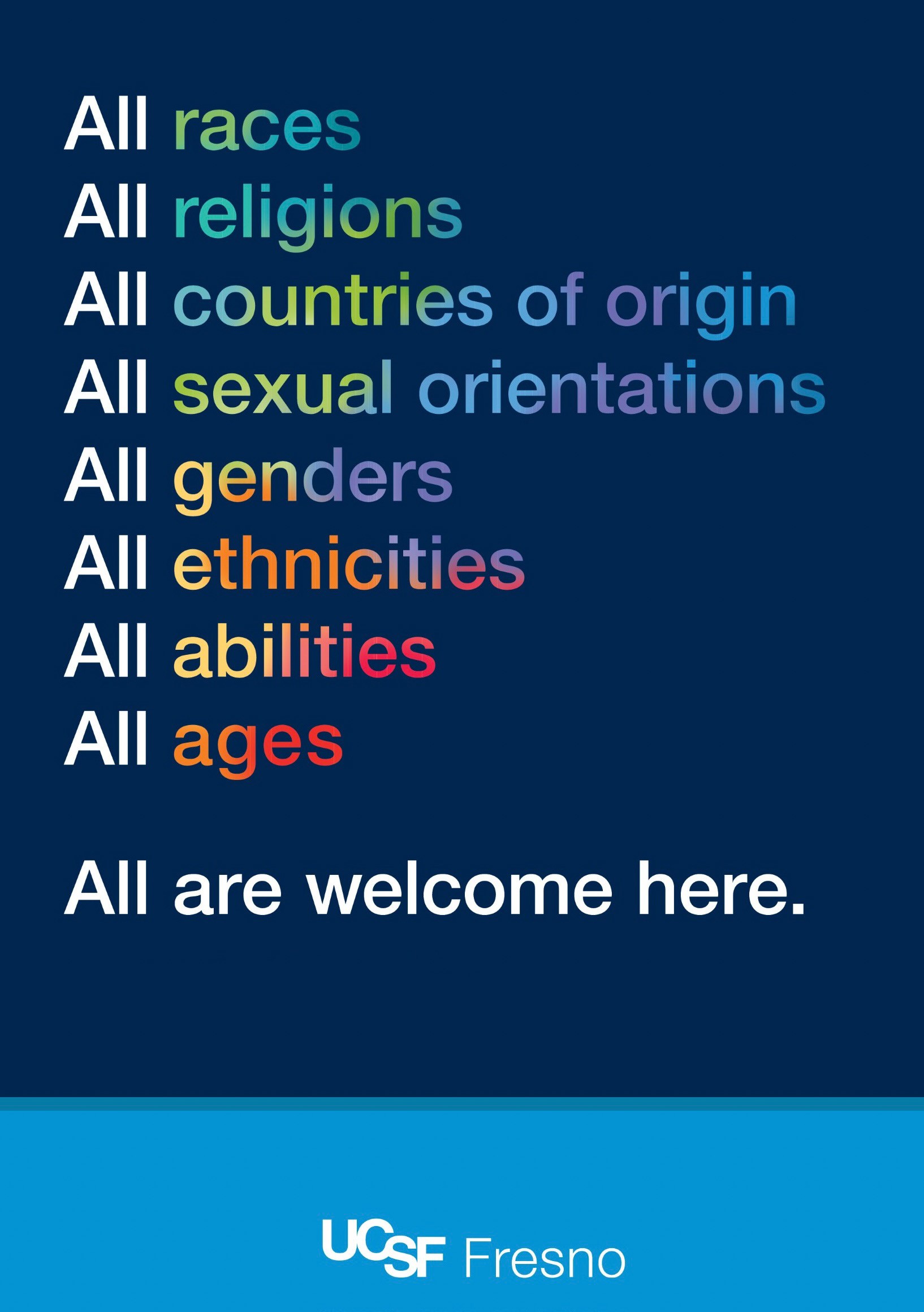
The first patient to be treated in Fresno with a transformative immunotherapy for blood cancer rang a victory bell this summer, the culmination of a four-year effort led by Haifaa Abdulhaq, MD, director of Hematology at UCSF Fresno, to bring CAR T-cell therapy to the San Joaquin Valley.
CAR T-cell therapy is a revolutionary treatment for certain types of leukemia, lymphoma, and myeloma, in which the patient’s immune T lymphocytes (white blood cells) are genetically adapted to identify, target, and kill cancer cells.
The treatment can offer a cure or long-term remission for patients who do not respond to other therapies or have blood cancers return. “For lymphoma, for example, the complete response varies based on the product between 50% to 60%, and you can cure about 40% to 50% of patients who otherwise would have lived for only months,” said Dr. Abdulhaq, an Inspire Health Medical Group oncologist, UC San Francisco professor of Medicine at the UCSF School of Medicine regional campus at Fresno (UCSF Fresno), and director of the Community Medical Centers Cellular Program.
The closest CAR T-cell therapy had been hours away from the Valley, at UCSF in San Francisco, UC Davis, and UCLA.
“We’re just so excited for our patients because this is truly a transformative treatment that will change the lives of so many patients in the Valley, and they will be able to get treatment close to home,” Dr. Abdulhaq said.
Starting a CAR T therapy program in the Valley involved collaboration with Community Health System (CHS), the primary clinical partner for UCSF Fresno; Thomas G. Martin, MD, the associate chief hematology/oncology and director of hematology transplant and cell therapy at UCSF School of Medicine; and with Novartis, a Swiss medicine company that manufactures CAR T-cells.
UCSF shared standard procedures with Dr. Abdulhaq, which streamlined the process of getting a CAR T-cell (chimeric antigen receptor T cell) program in Fresno. Still, Dr. Martin credits Dr. Abdulhaq for bringing all the parties together. “She is very collaborative and really wants to do the best for the patients and for UCSF Fresno,” he said. “It’s not just a collaboration amongst doctors; it’s a collaboration of taking care of patients; it’s a collaboration between facilities.”
To start a CAR T cell therapy program at UCSF Fresno, Dr. Abdulhaq said three components were necessary: An apheresis machine to collect a patient’s T cells, a laboratory to process and engineer the CAR T-cells and preserve them until the patient is ready for infusion, and clinical expertise to take care of a patient for the apheresis procedure, at the infusion of the CAR T-cells, and for monitoring and after care.
Dr. Abdulhaq began discussions with CHS in 2021 to secure an apheresis machine for collecting a patient’s T cells, and with Novartis, which manufactures one of the CAR-Ts for lymphoma and leukemia. She started building the team at CHS and contacted Dr. Martin at UCSF in 2022. In addition to sharing UCSF standard procedures for laboratory and pharmacy, nursing procedures and training were provided. “That actually sped up things by at least a year,” Dr. Abdulhaq said.
CAR T-cell treatment is an intensive procedure. The patient’s T cells are removed through apheresis in the hospital, and the remaining blood is returned to the body. The collected T cells are sent to the laboratory for processing, where a gene for the special chimeric antigen receptor (CAR) is inserted into the cells. Millions of lab-grown CAR T cells are infused back into the patient for an effective treatment.
Five days before the infusion, the patient receives a low dose of chemotherapy as an outpatient to create a more favorable environment for the infused CAR T-cells to expand. Patients are admitted to the hospital to receive the infusion of CAR T-cells and can remain there for two weeks or up to a month to monitor any side effects from the treatment. Patients are followed for a year or longer for infections or other immune system effects.
Dr. Abdulhaq’s first CAR T-cell therapy patient, Christine Quintero of Fresno, received treatment on May 27, 2025, at Clovis Community Medical Center (CCMC) in Clovis. A PET scan (a positron emission tomography scan) in June to look for cancer cells showed she was cancer-free.
“I was really happy, and I texted my family and my kids, and we’re just happy,” Quintero said on July 18, before ringing a bell at the Community Cancer Institute (CCI) in Clovis in celebration of the end of her cancer treatment.
Quintero is grateful she did not have to travel outside of Fresno. “I would have had to stay in the hospital for 15 days and another 15 days on the site, which, financially, would have cost us,” she said. “So, I am really happy … about being able to come to the Community Cancer Institute and be able to see Dr. Abdulhaq.”
Dr. Martin said blood cancer patients in a large catchment area around UCSF Fresno now have treatment available close to their homes. “This will dramatically increase access,” he said. “This is really enhancing the lives of patients with cancer in the UCSF Fresno area.”
UCSF’s expertise was invaluable for mentoring and guidance in bringing CAR T-cell therapy to UCSF Fresno, Dr. Abdulhaq said. “We had to satisfy requirements for quality, training, standard operating procedures, and meet quality measures in apheresis, the nursing aspect, and the hospital facility aspect.”
Dr. Martin said Dr. Abdulhaq had laid the groundwork. “The credit there, of the opening of CAR T-cell therapy, is directly on Dr. Abdulhaq,” he said. “She is a tremendous asset for UCSF Fresno.”
Said Dr. Abdulhaq, “It really takes a village to build the CAR T program. We were able to build that here at UCSF Fresno and the Community Cancer Institute, and this is only the start; we plan to keep building and expanding this program.”





